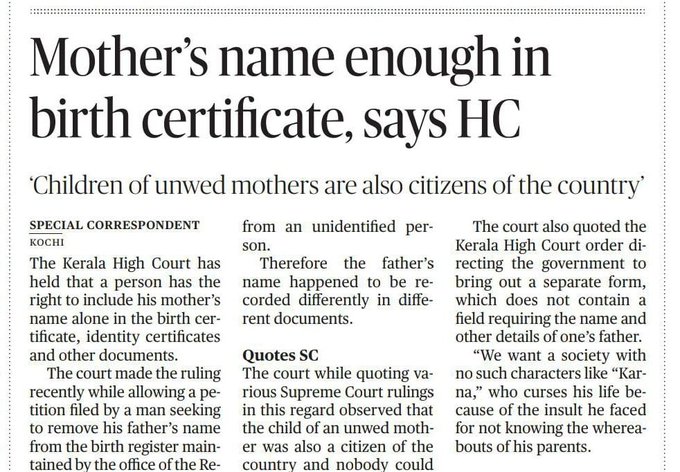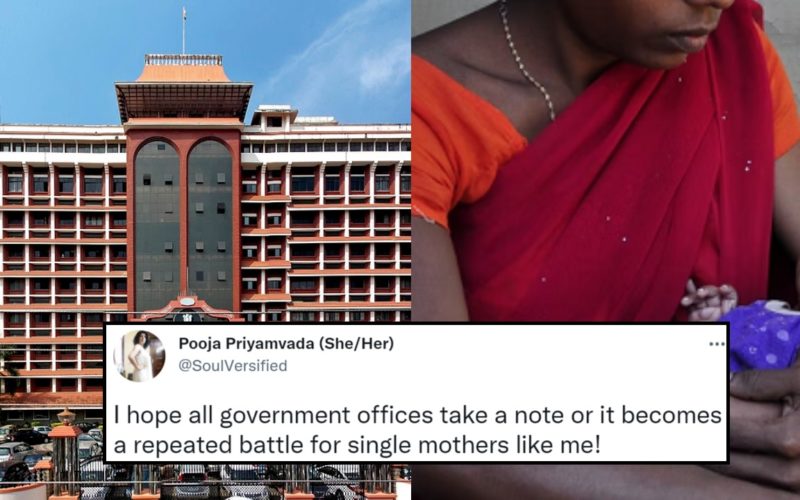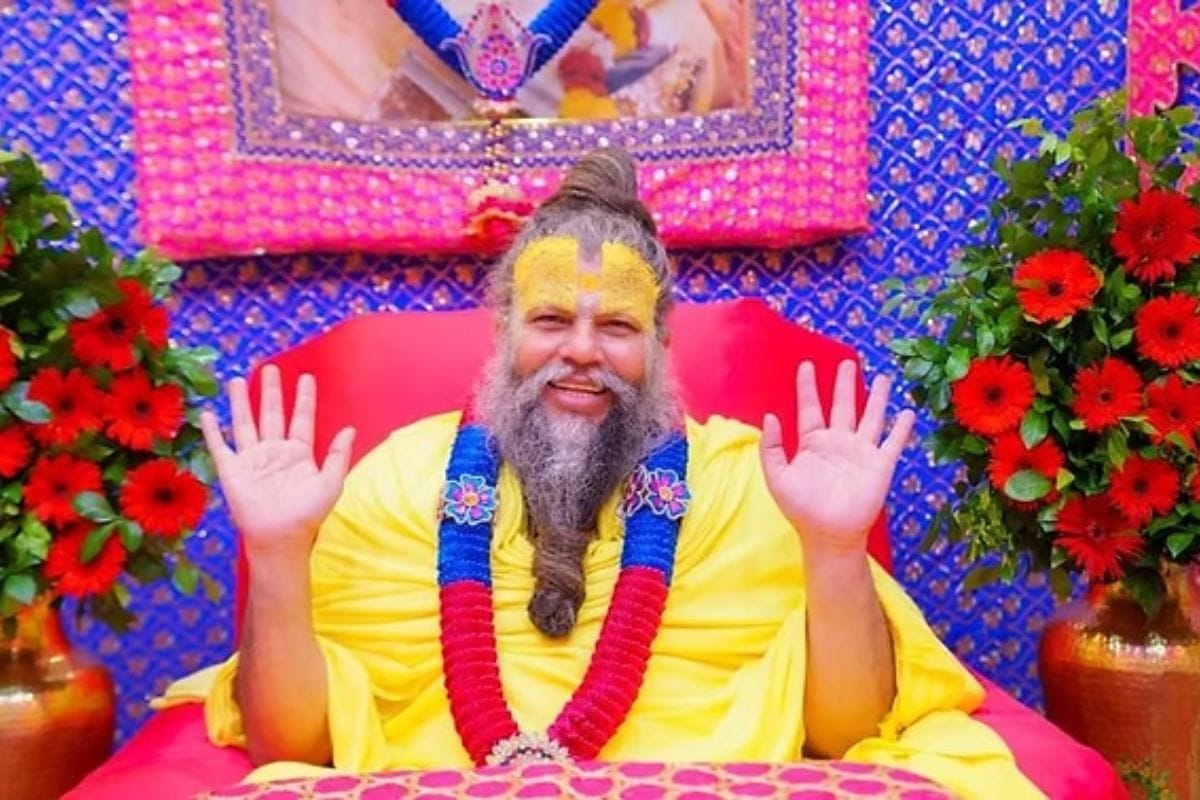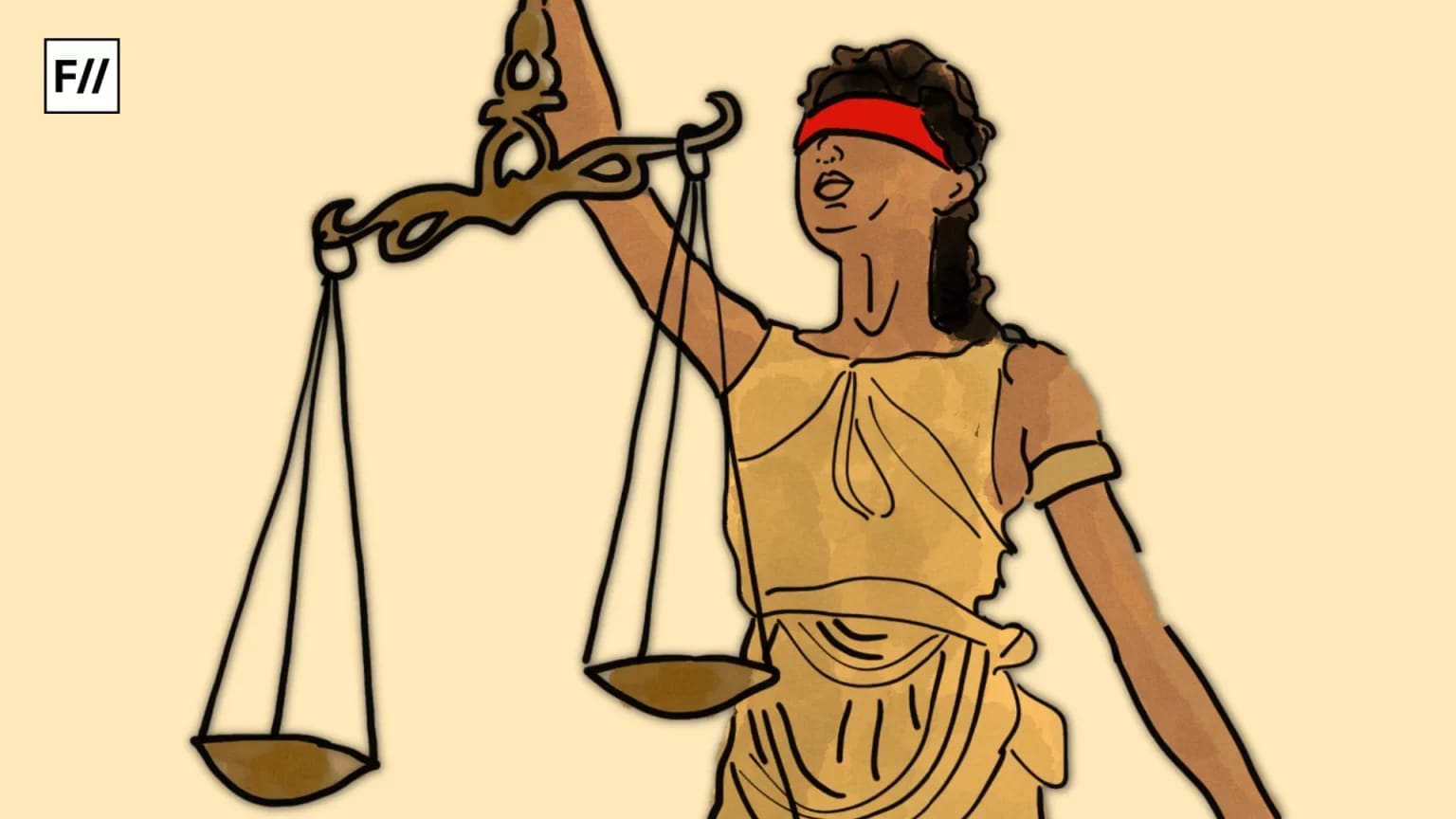In a recent decision, the Kerala high court held that having the mother’s name alone in identificatory documents like birth certificates, Adhaar cards, and other documents is every person’s right. The name of the father need not be included in documents if the person so wishes.
This judgment was made after a petitioner approached the court with a plea that he was conceived when his mother was a minor, and he wished to remove his father’s name from his documents as he had no relationship with him. The petitioner wished to have a fresh birth certificate issued that indicates only his mother’s name. The first petitioner mentioned that his mother, who was the second petitioner, was impregnated under odd circumstances by someone unknown. The petitioner also added that the mother’s name was the same all over, while his father’s name was varied across different documents.
Justice P. V. Kunhikrishnan in the judgment, comments on the right to live with dignity, liberty, privacy, and the need to respect unwed mothers, single parents, sexual assault and rape victims, and their children, because they are as much a citizen of the country as any other person. Consequently, no authority should act as a hindrance in doing so, and any person can choose not to specify their father’s name in documents.

The court also acknowledged the “mental agony” of children of unmarried women and rape survivors and emphasised that their fundamental rights should not be breached and also that the state must safeguard all citizens including them.
The patrilineal norm of inheriting the father’s name is very common across India except in a few communities in the southern part. The father is seen as the most important figure in the family. This last name tradition is inevitably reflective of one’s caste-class identities and often subjects them to prejudice. This patriarchal practice is very deeply ingrained into most institutions and penetrates legal mandates. The nomenclature of surnames is also a social pressure as men are considered more “worthy” or valuable in all senses when women are required to use their names as surnames
The court touched upon a letter issued by the Ministry of Home Affairs as per which all chief registrars of births and deaths were instructed that in instances of single mothers or unwed mothers if the mother provides an affidavit, the birth certificate is to be issued without questioning or enquiring about the identity of the father. The high court also referred to a previous decree of the court as per which a separate form was to be issued that does not require the father’s name and any other related fields to be removed.
In addition, Justice P. V. Kunhikrishnan also cited the tale of the character ‘Karna’ from the epic ‘Mahabharata’. Karna was fraught because he did not know who his parents were. There should not be any characters like Karna in our society, implied the court. The Constitution and the courts will protect the new age ‘Karnas’ added Justice Kunhikrishnan.
Also read: Sexual Harassment Charge Invalid If Women Wears “Provocative Clothes”: Kerala High Court

Similarly, in 2021, the Delhi High Court ruled that every child has the right to use their mother’s surname. The court also said that the father does not own the daughter, so he has no right to decide for her what the last name she is to use.
The patrilineal norm of inheriting the father’s name is very common across India except in a few communities in the southern part. The father is seen as the most important figure in the family. This last name tradition is inevitably reflective of one’s caste-class identities and often subjects them to prejudice.
This patriarchal practice is very deeply ingrained into most institutions and penetrates legal mandates. The nomenclature of surnames is also a social pressure as men are considered more “worthy” or valuable in all senses when women are required to use their names as surnames.
It comes as a standard practice to us that the child acquires the father’s family name as he is the “head” of the family and his lineage is to be carried forward. The mother and her role are disregarded for the most part. The nomenclature of last names in India permeates the boundary of religious communities and goes on to characterise a myriad of information about the individual.
This judgment provides a sense of confidence and autonomy to mothers that do not live with their partners or are unwed or divorced. Also to some extent, they have the potential to set aside the guilt they are made to feel by society regarding child care or parenting choices and how they wouldn’t be able to do it without the father of their child(ren). This judgment is enabling for mothers as they often struggle to assert their parental rights over their children even though they are mostly the main caregivers. Single parents have time and again proven that they can raise children just as well
What follows this judgement?
This judgment is a tread towards something very significant. The shame and stigma attached to single, divorced, and/or unwed mothers are highly distressing. The absence of the father puts the mother under criticism and she is bombarded with questions on how she would raise the child/children alone, and manage work and home.
Single mothers are also blamed for their failed marriages. It is already mentally and emotionally challenging for single mothers to survive, and the legal bottleneck mandatorily requiring the father’s identity would only add to the problem. Thanks to this landmark judgment, the children and mothers can easily get done with administrative and legal work of reflecting their parental identity without prejudice.

This judgment provides a sense of confidence and autonomy to mothers that do not live with their partners or are unwed or divorced. Also to some extent, they have the potential to set aside the guilt they are made to feel by society regarding child care or parenting choices and how they wouldn’t be able to do it without the father of their child(ren).
This judgment is enabling for mothers as they often struggle to assert their parental rights over their children even though they are mostly the main caregivers. Single parents have time and again proven that they can raise children just as well.
The traditional parenting roles also become interrogated when a child is raised by a single parent. They have to play conventional roles of both parents. Therefore, it brings about a sense of equality in parenting. There’s no mother’s task or father’s task but a parent’s task for their child.
Whether it’s changing diapers or dropping the kids to school, it is done by the same parent or someone else the parent delegates the task. Similarly, this judgment creates an equivalence. The child can, without thinking twice, fill up their mother’s name in the parent section whenever it is required like in school forms, identity documents, etc. There is no room for indecisiveness or prejudice.
Also read: Analysing The Gendered Poverty, Homelessness & Single Motherhood In Netflix’s Maid
Featured Image Source: News8Plus
About the author(s)
Tuba is currently pursuing an Undergraduate Degree in political science, at the Delhi University. She likes reading about current affairs and also loves cats, movies, k-dramas, chai, and staying in. At other times, you would probably find her taking pictures of the sky, if not listening to music





👏🏾👏🏾👏🏾